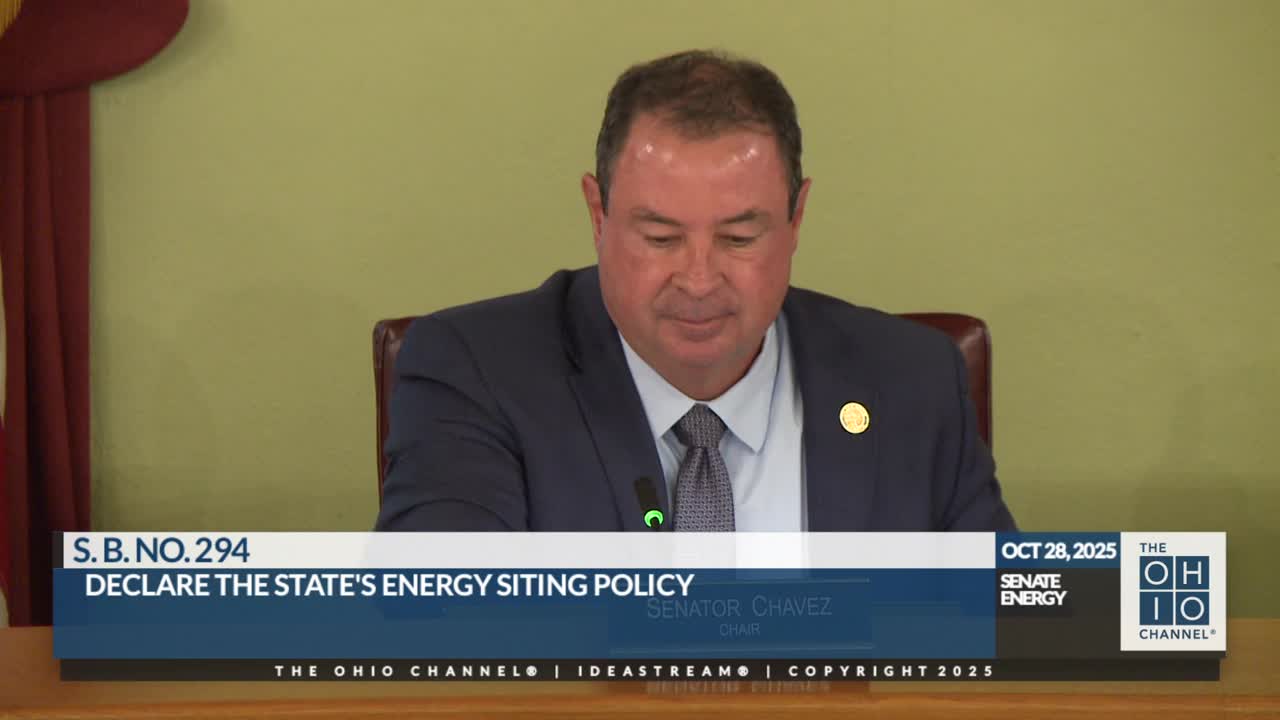Senators introduce ARC Energy Security Act to prioritize domestic, dispatchable generation

Summary
Senator Lang and Senator Romanchuk appeared before the Senate Energy Committee to present sponsor testimony on Senate Bill 294, the ARC Energy Security Act, which the sponsors said would make it state policy to prioritize ‘affordable, reliable and clean energy security’ and favor domestic production when the Power Siting Board considers applications for utility facility certificates.
Senator Lang and Senator Romanchuk appeared before the Senate Energy Committee to present sponsor testimony on Senate Bill 294, the ARC Energy Security Act, which the sponsors said would make it state policy to prioritize ‘‘affordable, reliable and clean energy security’’ and favor domestic production when the Power Siting Board considers applications for utility facility certificates.
The bill’s sponsors told the committee the measure is three pages long and would require the Power Siting Board to consider (1) use of ‘‘affordable, reliable and clean energy sources,’’ (2) prioritization of domestic production except for energy from nuclear reaction, and (3) minimization of reliance on ‘‘foreign adversary nations’’ for critical materials or manufacturing needed to deliver energy to Ohio customers. "Senate Bill 294 is a 3 page bill that will take another step to do just that," Senator Lang said in his opening remarks.
Senate Bill 294 would also define affordability using what the sponsors described as ‘‘true cost accounting’’ and would direct the siting board to prefer generation that is highly reliable. Senator Romanchuk said a pending substitute will remove language he and others worried could disincentivize nuclear investment: "a subbill is in the works that will strike lines 16 through 21 of the bill to ensure nothing in the bill disincentivizes nuclear energy investment in our state and strengthens the bill's language prioritizing American and Ohio built infrastructure," he said.
Why it matters: The bill aims to shape the criteria the Power Siting Board uses when approving new utility facilities. Sponsors argued that prioritizing domestic and dispatchable fuels will support industrial recruitment and grid reliability as Ohio’s energy needs grow.
Committee questions focused on two central issues: whether natural gas qualifies as a ‘‘clean energy source’’ under the bill, and how the bill treats intermittent renewables such as wind and solar. Ranking Member Smith asked why natural gas would be classified as clean given the bill’s language, noting the bill’s list of sources includes ‘‘hydrocarbons.’’ Senator Lang responded: "There is demonstrable empirical evidence that shows how clean natural gas is compared to most other energy sources," and he offered to provide supporting data. Romanchuk added that the bill requires any hydrocarbons or other listed clean sources to meet the national ambient air quality standards set by the U.S. Environmental Protection Agency under the Clean Air Act, saying, "So even though you might be burning a hydrocarbon, it still has to meet those standards."
Senator DeMora pressed the sponsors on why the bill does not explicitly mention wind and solar. Lang said the bill is designed to require power generation that meets high reliability standards, listing three screening criteria in the bill’s language: a minimum capacity factor of 50 percent, an output that is dispatchable at all times, or the ability to complement renewable resources and provide backup to them. He said some wind and solar projects may not meet those thresholds today, though he added that technological changes could alter that in the future.
Senator Serino summarized the approach as effectively favoring baseload or storable resources that are available regardless of solar or wind output. "I think that's the essence of what you're doing," Serino said.
The committee took no vote on the bill; the sponsors provided testimony and answered questions and the hearing concluded with no formal action recorded on Senate Bill 294.
Ending: Sponsors said they will supply additional data to the committee and work on language changes. The hearing record shows the bill remains at the committee hearing stage pending further work and possible substitute language.

